Hyperpigmentation is a common skin condition that affects many individuals, causing patches of skin to become darker than the surrounding areas. But good news is here is a solution for your skin problem. Gluta one has the skin whitening capsules for hyper pigmentation. Check the details and necessary information that will lead you to the ultimate care of your skin.
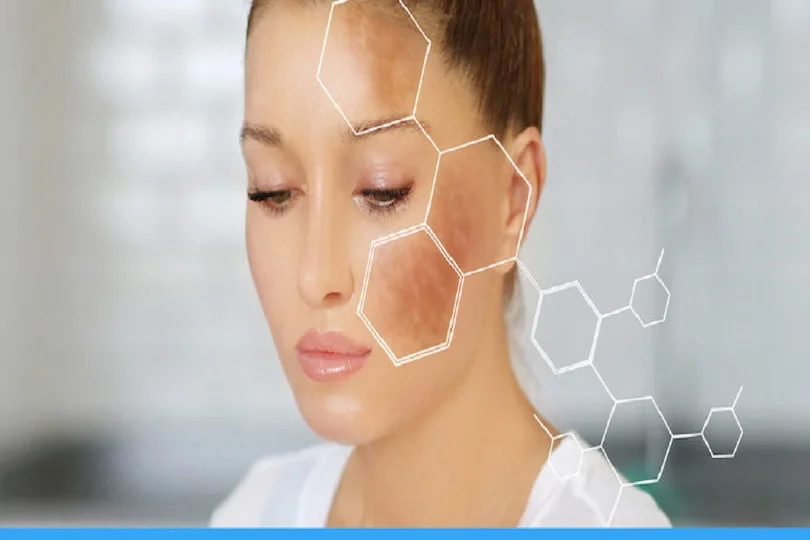
Understanding Hyperpigmentation and its Effects
To comprehend hyperpigmentation and its effects on the skin, it is crucial to delve into its underlying causes and contributing factors. Excessive melanin production, the pigment responsible for skin color, is often the primary culprit behind hyperpigmentation. This overproduction can be triggered by various factors such as sun exposure, hormonal changes, skin trauma, and certain medical conditions.
-
Product on sale
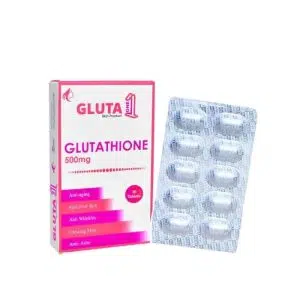 Gluta One Skin Whitening CapsuleOriginal price was: PKR 3,699.PKR 2,999Current price is: PKR 2,999.
Gluta One Skin Whitening CapsuleOriginal price was: PKR 3,699.PKR 2,999Current price is: PKR 2,999. -
Product on sale
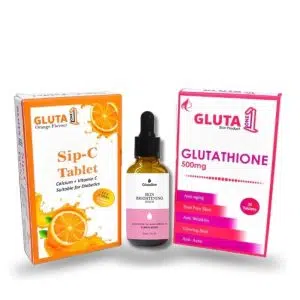 Gluta One Complete PackageOriginal price was: PKR 5,699.PKR 5,399Current price is: PKR 5,399.
Gluta One Complete PackageOriginal price was: PKR 5,699.PKR 5,399Current price is: PKR 5,399. -
Product on sale
 Gluta C Single Pack Vitamin C Tablets For Skin WhiteningOriginal price was: PKR 1,099.PKR 999Current price is: PKR 999.
Gluta C Single Pack Vitamin C Tablets For Skin WhiteningOriginal price was: PKR 1,099.PKR 999Current price is: PKR 999.

What Causes Hyperpigmentation?
Hyperpigmentation can be caused by a variety of factors, each contributing to the overproduction or uneven distribution of melanin in the skin. Understanding the causes behind hyperpigmentation is crucial in order to effectively address and manage the condition.
One of the primary causes of hyperpigmentation is excessive sun exposure. Ultraviolet (UV) radiation from the sun stimulates melanin production as a defense mechanism to protect the skin from damage. Prolonged exposure to the sun without adequate sun protection can lead to the development of dark spots and an overall uneven skin tone.
Hormonal changes also play a significant role in the occurrence of hyperpigmentation. Many women experience melasma, a form of hyperpigmentation, during pregnancy due to hormonal fluctuations. Similarly, the use of certain hormonal medications, such as oral contraceptives, can trigger the onset of hyperpigmentation.
Skin trauma, such as acne breakouts, cuts, burns, or inflammation, can result in post-inflammatory hyperpigmentation. When the skin undergoes trauma or inflammation, it responds by producing excess melanin in the affected area, leading to the formation of dark spots or patches.
Certain medical conditions and medications can also contribute to hyperpigmentation. Conditions such as Addison’s disease, hemochromatosis, and some autoimmune disorders may cause changes in skin pigmentation. Additionally, certain medications, such as nonsteroidal anti-inflammatory drugs (NSAIDs), antimalarial drugs, and some chemotherapy agents, have been associated with hyperpigmentation as a side effect.
It is important to note that genetic predisposition can also influence an individual’s susceptibility to hyperpigmentation. Some individuals may naturally have a higher concentration of melanin in their skin, making them more prone to developing hyperpigmentation.
By understanding the various causes of hyperpigmentation, individuals can take proactive measures to minimize its occurrence. Implementing sun protection, managing hormonal changes, practicing proper skincare, and seeking professional advice when necessary are essential steps in preventing and managing hyperpigmentation effectively.
Different Types of Hyperpigmentation
Hyperpigmentation manifests in various forms, and understanding the different types is essential for proper identification and targeted treatment. Here are some of the most common types of hyperpigmentation:
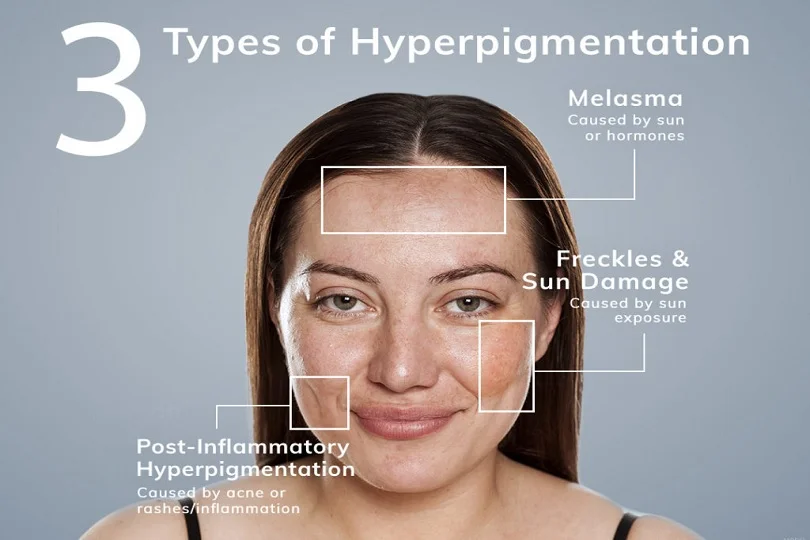
1. Melasma
Melasma, also known as chloasma, is a form of hyperpigmentation characterized by symmetrical patches of darkened skin. It commonly affects the face, especially the forehead, cheeks, and upper lip. Hormonal fluctuations, such as those occurring during pregnancy or due to oral contraceptive use, often trigger melasma.
2. Post-Inflammatory Hyperpigmentation (PIH)
PIH occurs as a result of skin trauma, such as acne breakouts, cuts, burns, or inflammatory skin conditions. After the skin experiences inflammation or injury, excess melanin production leads to dark spots or patches in the affected area. PIH can affect people of all skin types and is particularly common in individuals with darker skin tones.
3. Sunspots or Solar Lentigines
Sunspots, also known as solar lentigines or age spots, are darkened patches of skin caused by prolonged sun exposure. They typically appear on areas of the body exposed to the sun, such as the face, hands, shoulders, and arms. Sunspots are more prevalent in older individuals but can also occur in younger people with significant sun exposure.
4. Freckles
Freckles are small, flat, light to dark brown spots that develop as a result of genetic predisposition and sun exposure. They are more commonly seen in individuals with fair skin and often appear on sun-exposed areas, such as the face and shoulders. Freckles may darken or become more prominent with sun exposure.
5. Lentigines
Lentigines are similar to sunspots, but they are not directly related to sun exposure. These dark spots tend to be more uniform in color and are commonly found on areas of the body that receive less sun exposure, such as the hands and face. Lentigines can occur due to aging or genetic factors.
6. PIH from Skin Treatments
Certain skin treatments, such as laser therapy, chemical peels, or dermabrasion, can sometimes lead to post-inflammatory hyperpigmentation as a temporary side effect. It is important to follow proper aftercare instructions and protect the skin during the healing process to minimize the risk of PIH.
By recognizing the different types of hyperpigmentation, individuals can better understand their specific condition and seek appropriate treatments tailored to their needs. Consulting with a dermatologist or skincare professional can help determine the most effective approach for managing and reducing hyperpigmentation based on the specific type and severity of the condition.
The Impact of Hyperpigmentation on Skin Tone
Hyperpigmentation can have a noticeable impact on the overall skin tone and complexion of individuals affected by this condition. Understanding the effects of hyperpigmentation on skin tone is important for those seeking to address and manage the discoloration effectively.
Hyperpigmentation can lead to the development of dark spots, patches, or uneven areas of increased pigmentation on the skin. These areas appear darker than the surrounding skin, creating an uneven or blotchy appearance. The contrast between the hyperpigmented areas and the normal skin tone can be particularly noticeable, especially in individuals with lighter skin tones.
One of the main consequences of hyperpigmentation on skin tone is the loss of a uniform complexion. The darkened areas can disrupt the overall balance and evenness of the skin tone, making it appear less smooth and radiant. This can impact a person’s self-confidence and make them feel self-conscious about their skin’s appearance.
Hyperpigmentation can also give the skin a dull or aged appearance. Dark spots or patches can create an impression of unevenness and contribute to a lack of brightness and vitality in the complexion. This can make individuals appear older or tired, even if they are not.
In addition, hyperpigmentation can affect the way light reflects off the skin. The presence of darkened areas can alter the way light interacts with the skin, resulting in a less luminous and radiant look. This can further contribute to a diminished overall skin tone and a loss of natural glow.
The impact of hyperpigmentation on skin tone varies from person to person, depending on factors such as the extent and location of the discoloration, individual skin type, and overall skin health. However, for many individuals, hyperpigmentation can significantly affect their perception of their own skin and overall appearance.
Addressing hyperpigmentation through targeted treatments and skincare approaches can help restore a more even and balanced skin tone. By effectively managing and reducing hyperpigmentation, individuals can regain confidence in their skin’s appearance and achieve a more radiant, uniform complexion.
Skin Whitening Capsules for Hyperpigmentation
Skin whitening capsules for hyperpigmentation offer a promising solution for individuals seeking to address uneven skin tone and reduce the appearance of dark spots. These capsules are formulated with specific ingredients that work synergistically to promote skin brightening and help minimize hyperpigmentation. Understanding the basics of skin whitening capsules and their potential benefits is essential for those considering this approach.
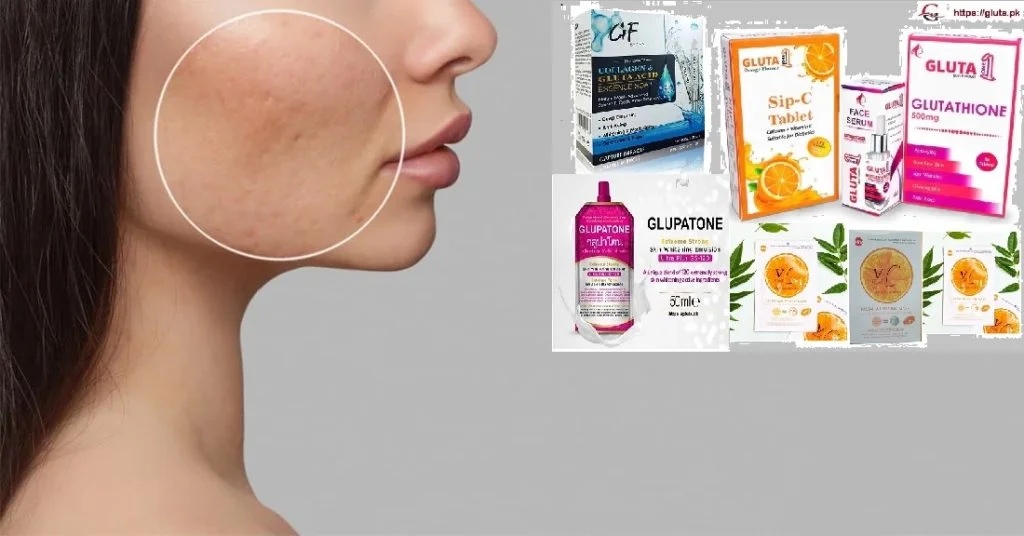
How Do Skin Whitening Capsules Work?
Skin whitening capsules work through a combination of key mechanisms to address hyperpigmentation and promote a more even skin tone. Understanding how these capsules work can help individuals make informed decisions about incorporating them into their skincare routine.
1. Inhibiting Melanin Production
Skin whitening capsules often contain ingredients that help inhibit the production of melanin, the pigment responsible for skin color. These ingredients, such as vitamin C, glutathione, and kojic acid, work by blocking or suppressing the activity of the enzyme tyrosinase, which is involved in melanin synthesis. By reducing melanin production, these capsules can help fade dark spots and minimize hyperpigmentation.
2. Antioxidant Protection
Many skin whitening capsules contain potent antioxidants, such as vitamin C, that help protect the skin from oxidative stress caused by environmental factors like UV radiation and pollution. Oxidative stress can contribute to hyperpigmentation and skin damage. Antioxidants neutralize free radicals, which are unstable molecules that can damage skin cells and lead to uneven skin tone. By providing antioxidant protection, these capsules help promote a healthier complexion.
3. Promoting Skin Cell Renewal
Some ingredients in skin whitening capsules, like niacinamide, help promote skin cell renewal and exfoliation. By accelerating the shedding of dead skin cells and promoting the growth of new cells, these capsules can help improve skin texture and fade hyperpigmentation. This process also allows for better absorption of other skincare products, enhancing their effectiveness in targeting hyperpigmentation.
4. Brightening and Evening Out Skin Tone
Skin whitening capsules often contain skin-brightening ingredients like licorice extract and botanical extracts. These ingredients help to even out the skin tone by reducing the appearance of dark spots and promoting a brighter complexion. They work by inhibiting melanin transfer to the upper layers of the skin, thereby minimizing the visibility of hyperpigmentation.
It is important to note that the effectiveness of skin whitening capsules can vary depending on factors such as the individual’s skin type, the severity of hyperpigmentation, and consistent usage. It is recommended to follow the recommended dosage and duration of use provided by the manufacturer or consult with a dermatologist or skincare professional for personalized advice.
Skin whitening capsules are most effective when used in conjunction with a comprehensive skincare routine that includes sun protection, regular exfoliation, and the use of other targeted treatments or products. Consistency and patience are key when incorporating skin whitening capsules into a skincare regimen, as visible results may take time to appear.
Key Ingredients in Skin Whitening Capsules
Skin whitening capsules incorporate key ingredients that are carefully selected for their ability to promote skin brightening and address hyperpigmentation. These ingredients work synergistically to deliver the desired effects. Here are some key ingredients commonly found in skin whitening capsules:
1. Glutathione
Glutathione is a powerful antioxidant naturally produced by the body. It helps inhibit the production of melanin, the pigment responsible for skin color, and assists in detoxification. Glutathione has been widely used in skin whitening capsules due to its potential to lighten skin tone and reduce hyperpigmentation.
2. Vitamin C
Vitamin C, also known as ascorbic acid, is a well-known antioxidant that helps protect the skin against oxidative stress and supports collagen production. It plays a vital role in inhibiting melanin production and reducing the appearance of dark spots. Vitamin C also aids in brightening the skin tone and improving overall skin radiance.
3. Niacinamide
Niacinamide, a form of vitamin B3, offers multiple benefits for the skin. It helps reduce hyperpigmentation by suppressing the transfer of melanin to the upper layers of the skin. Niacinamide also supports skin barrier function, improves skin texture, and reduces inflammation, making it an effective ingredient in skin whitening capsules.
4. Alpha-Arbutin
Derived from bearberry plants, alpha-arbutin is a natural skin lightening agent. It works by inhibiting tyrosinase, the enzyme involved in melanin production, leading to a reduction in hyperpigmentation. Alpha-arbutin is considered a safe and effective alternative to hydroquinone, a traditional skin lightening ingredient.
5. Kojic Acid
Kojic acid is derived from certain fungi and is known for its skin lightening properties. It inhibits tyrosinase activity, thereby reducing melanin production and helping to fade hyperpigmentation. Kojic acid is often used in skincare products targeting age spots, sunspots, and post-inflammatory hyperpigmentation.
6. Licorice Extract
Licorice extract contains a compound called glabridin, which helps inhibit tyrosinase activity and reduce melanin production. It has skin brightening and soothing properties, making it beneficial for fading hyperpigmentation and improving overall skin tone.
These key ingredients, when combined in skin whitening capsules, work together to address hyperpigmentation, promote a more even skin tone, and provide antioxidant protection. It is important to note that individual results may vary, and it is recommended to consult with a dermatologist or skincare professional before incorporating skin whitening capsules into your skincare routine.
Choosing the Right Skin Whitening Capsules
When selecting skin whitening capsules for hyperpigmentation, it is important to consider several factors to ensure you choose a product that suits your needs and provides effective results. Here are some key factors to consider:
1. Ingredients
Look for capsules that contain key ingredients known for their skin-brightening properties, such as glutathione, vitamin C, niacinamide, kojic acid, and licorice extract. Research these ingredients to understand their effectiveness in targeting hyperpigmentation and choose capsules that have a well-balanced blend of these ingredients.
2. Quality and Safety
Ensure that the capsules are manufactured by a reputable and trusted company. Look for certifications or third-party testing to ensure the product meets quality and safety standards. It is advisable to choose capsules that are free from harmful additives, fillers, or artificial ingredients.
3. Dosage and Instructions
Check the recommended dosage and usage instructions provided by the manufacturer. It is important to follow the instructions carefully to achieve optimal results and avoid any potential side effects. Consider capsules that provide clear guidelines on when and how to take them for maximum effectiveness.
4. Customer Reviews and Feedback
Read customer reviews and testimonials to get insights into the experiences of others who have used the capsules. Look for feedback specifically related to their effectiveness in addressing hyperpigmentation. However, keep in mind that individual experiences may vary, so consider a range of reviews before making a decision.
5. Skin Sensitivity
Consider your skin type and sensitivity. Some individuals may have more sensitive skin that can react to certain ingredients. If you have a history of skin sensitivity or allergies, it is advisable to consult with a dermatologist before using skin whitening capsules to ensure they are suitable for your skin.
6. Combination with Other Skincare Products
Consider how the capsules can fit into your existing skincare routine. It is often beneficial to combine the use of skin whitening capsules with other topical treatments, such as serums or creams, for a comprehensive approach to hyperpigmentation. Ensure the capsules can be used alongside your preferred skincare products without any potential interactions.
7. Expected Results and Timeframe
Have realistic expectations regarding the results and timeframe. Skin whitening is a gradual process, and it may take several weeks or months to see visible improvements. Avoid products that promise overnight results, as they may not be effective or safe.
Remember, consulting with a dermatologist or skincare professional is recommended, especially if you have underlying skin conditions or concerns. They can provide personalized advice and recommend the most suitable skin whitening capsules based on your specific needs and goals.
Reading and Understanding Product Labels
Reading and understanding product labels is crucial when selecting skin whitening capsules for hyperpigmentation. It allows you to make informed decisions about the product’s ingredients, usage, and potential benefits. Here are some key aspects to consider when reading and understanding product labels:
1. Ingredient List
Start by examining the ingredient list on the product label. Ingredients are usually listed in descending order of concentration. Look for key ingredients known for their skin whitening and hyperpigmentation-fighting properties, such as glutathione, vitamin C, niacinamide, kojic acid, and licorice extract. Ensure that these active ingredients are present in significant amounts.
2. Concentration and Potency
Some labels may indicate the concentration or potency of specific ingredients. This information can help you gauge the strength of the product and its potential effectiveness. Higher concentrations of active ingredients may yield more noticeable results, but it is essential to follow recommended dosage guidelines to ensure safety and avoid any adverse reactions.
3. Usage Instructions
Pay close attention to the usage instructions provided on the label. This includes information on how often to take the capsules, whether they should be taken with food or on an empty stomach, and any specific timing recommendations. Follow the instructions carefully to maximize the capsules’ effectiveness and minimize the risk of side effects.
4. Warnings and Precautions
Look for any warnings or precautions mentioned on the label. This information may include contraindications, potential side effects, and instructions for individuals with specific medical conditions or allergies. If you have any known sensitivities or concerns, consult a healthcare professional before using the product.
5. Expiration Date and Storage Instructions
Check the expiration date on the label to ensure the capsules are within their shelf life. Expired products may be less effective or even harmful. Additionally, note any specific storage instructions, such as keeping the capsules away from direct sunlight or in a cool, dry place, to maintain their potency and quality.
6. Product Claims and Certifications
Pay attention to any claims made by the manufacturer regarding the product’s efficacy or certifications it may have obtained. Keep in mind that product claims should be supported by scientific evidence or studies. Look for certifications from reputable organizations or regulatory bodies that indicate adherence to quality and safety standards.
7. Manufacturer Information
Identify the name and contact information of the manufacturer or distributor. Having this information can be helpful if you have any questions, concerns, or feedback about the product. Reputable companies usually provide transparent and accessible contact details.
By carefully reading and understanding product labels, you can make more informed decisions about the skin whitening capsules you choose for hyperpigmentation. Remember to consider your individual needs, consult professionals if necessary, and follow the instructions for optimal results and safety.
Benefits, Safety Precautions & Use with Other Hyperpigmentation Treatments
Now lets discuss Benefits for using Skin Whitening Capsules for Hyperpigmentation. What safety measure one should take while using Skin Whitening Capsules and also see that how we can use Skin whitening Capsules with other Hyperpigmentation Treatments.
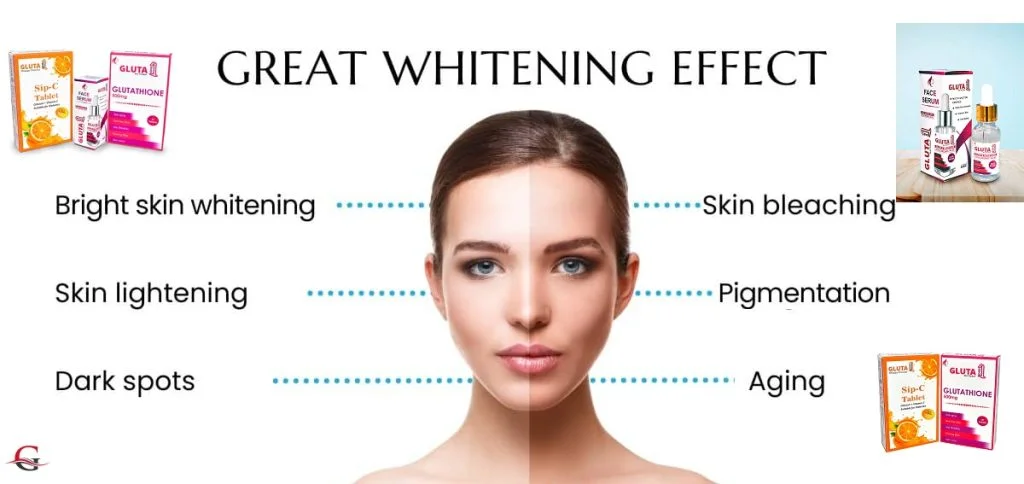
Benefits of Using Skin Whitening Capsules for Hyperpigmentation
Using skin whitening capsules for hyperpigmentation can offer several benefits for individuals seeking to address uneven skin tone and reduce the appearance of dark spots. Here are some key benefits of incorporating skin whitening capsules into your skincare routine:
1. Reduction of Hyperpigmentation
One of the primary benefits of using skin whitening capsules is their ability to reduce hyperpigmentation. These capsules contain ingredients that target melanin production and help fade dark spots and patches on the skin. By inhibiting the enzymes responsible for melanin synthesis, such as tyrosinase, these capsules can gradually lighten hyperpigmented areas and promote a more even skin tone.
2. Skin Brightening
Skin whitening capsules are formulated to brighten the complexion and enhance the overall radiance of the skin. Ingredients like vitamin C, glutathione, and licorice extract have skin brightening properties, helping to counteract dullness and improve the natural glow of the skin. Regular use of these capsules can result in a visibly brighter and more vibrant complexion.
3. Even Skin Tone
Uneven skin tone can be a source of concern for many individuals with hyperpigmentation. Skin whitening capsules can help even out the skin tone by reducing the visibility of dark spots and patches. As these capsules work to inhibit melanin production and fade hyperpigmentation, they contribute to a more uniform and balanced complexion.
4. Improved Skin Texture
In addition to addressing hyperpigmentation, skin whitening capsules often contain ingredients that improve skin texture. For example, niacinamide helps regulate sebum production and refine the appearance of pores, resulting in smoother and more refined skin. The overall effect is a skin surface that appears smoother and more even.
5. Antioxidant Protection
Many skin whitening capsules contain antioxidants that help protect the skin against free radicals and environmental damage. Antioxidants neutralize harmful molecules that can lead to premature aging and skin damage, thereby promoting healthier and more resilient skin. This protection from oxidative stress contributes to a more youthful and radiant complexion.
6. Boosted Confidence
Dealing with hyperpigmentation can impact an individual’s self-esteem and confidence. By effectively reducing the appearance of dark spots and promoting a more even skin tone, skin whitening capsules can help individuals regain their confidence and feel more comfortable in their own skin.
It is important to note that individual results may vary, and it is recommended to use skin whitening capsules as part of a comprehensive skincare routine that includes sun protection, gentle cleansing, and moisturizing. Consistent and long-term use is often necessary to achieve desired results. Consulting with a dermatologist or skincare professional can provide personalized guidance and ensure the safe and effective use of skin whitening capsules.
Safety Precautions and Possible Side Effects
When using skin whitening capsules for hyperpigmentation, it is important to take safety precautions and be aware of possible side effects. While these capsules can be effective in addressing hyperpigmentation, they may not be suitable for everyone. Here are some safety precautions and potential side effects to consider:
1. Consult a Healthcare Professional
Before starting any new skincare regimen or using skin whitening capsules, it is advisable to consult with a healthcare professional, such as a dermatologist. They can evaluate your skin condition, medical history, and any potential contraindications to determine if the capsules are suitable for you.
2. Follow Recommended Dosage
Adhere to the recommended dosage provided by the manufacturer. Taking more than the recommended amount does not guarantee faster or better results and can increase the risk of adverse effects. Always read and follow the instructions carefully.
3. Monitor for Allergic Reactions
Some individuals may be allergic to certain ingredients present in skin whitening capsules. Watch for any signs of allergic reactions such as itching, redness, swelling, or rash. If you experience any adverse reactions, discontinue use and seek medical attention.
4. Sun Protection
Hyperpigmented skin can be more sensitive to sunlight. It is crucial to protect your skin from harmful UV rays by applying sunscreen with a high SPF regularly, wearing protective clothing, and avoiding excessive sun exposure. Skin whitening capsules may increase the skin’s photosensitivity, so diligent sun protection is essential.
5. Gradual Approach
Results from skin whitening capsules may take time to become noticeable. Avoid the temptation to exceed the recommended dosage or use other skin lightening products simultaneously, as this can increase the risk of adverse effects. Patience and consistency are key to achieving safe and effective results.
6. Potential Side Effects
While side effects vary among individuals, some possible side effects of skin whitening capsules may include gastrointestinal discomfort, such as upset stomach or diarrhea. In rare cases, skin reactions such as dryness, irritation, or hypersensitivity may occur. If you experience any persistent or severe side effects, discontinue use and seek medical advice.
7. Pregnancy and Breastfeeding
If you are pregnant or breastfeeding, it is important to exercise caution when using skin whitening capsules. Some ingredients may not be safe during pregnancy or while nursing. Consult with your healthcare provider for personalized advice.
It is essential to prioritize your safety and well-being when using any skincare product. Keep an open line of communication with your healthcare professional throughout your skincare journey, and promptly report any concerns or side effects that you may experience.
Combining Capsules with Other Hyperpigmentation Treatments
Combining skin whitening capsules with other hyperpigmentation treatments can enhance their effectiveness and provide more comprehensive results. Here are some considerations and treatments that can be combined with skin whitening capsules:
1. Topical Skin Lightening Products
Incorporate topical treatments, such as creams or serums, specifically formulated to target hyperpigmentation. Look for products containing ingredients like hydroquinone, retinoids, alpha hydroxy acids (AHAs), or botanical extracts known for their skin brightening properties. These topical treatments can complement the effects of skin whitening capsules and provide localized treatment to specific areas of hyperpigmentation.
2. Sunscreen Protection
Hyperpigmented skin is more vulnerable to sun damage, which can worsen the appearance of dark spots and uneven skin tone. Always use a broad-spectrum sunscreen with a high SPF to protect your skin from harmful UV rays. Applying sunscreen regularly can help prevent further hyperpigmentation and maintain the results achieved with skin whitening capsules.
3. Gentle Exfoliation
Incorporate gentle exfoliation into your skincare routine to promote cell turnover and the removal of dead skin cells that can contribute to the appearance of hyperpigmentation. Opt for chemical exfoliants like AHAs or BHAs, or use gentle physical exfoliators. Regular exfoliation can improve the effectiveness of skin whitening capsules by allowing better absorption of the active ingredients.
4. Professional Treatments
Consider professional treatments like chemical peels, microdermabrasion, or laser therapies. These treatments can provide more intensive and targeted solutions for hyperpigmentation. Consult with a dermatologist or skincare professional to determine which treatments are suitable for your skin type and condition. Combining such professional treatments with skin whitening capsules can yield more significant improvements in hyperpigmentation.
5. Lifestyle Modifications
Certain lifestyle factors can contribute to hyperpigmentation, such as excessive sun exposure, hormonal imbalances, or poor skincare habits. Alongside using skin whitening capsules, make necessary lifestyle modifications. Limit sun exposure, wear protective clothing and accessories, maintain a healthy diet, manage stress levels, and establish a consistent skincare routine to support the overall health of your skin.
6. Patience and Consistency
Achieving noticeable improvements in hyperpigmentation requires patience and consistency. Remember that results may take time to become apparent. It is important to follow the recommended usage of both skin whitening capsules and any additional treatments, and to maintain a regular skincare routine to optimize their benefits.
Before combining skin whitening capsules with other treatments, it is recommended to consult with a dermatologist or skincare professional. They can assess your specific needs and provide personalized guidance on the most effective and safe combination of treatments for your hyperpigmentation concerns.
Conclusion
In conclusion, understanding hyperpigmentation and its effects on the skin is the first step in addressing this common skin concern. Hyperpigmentation can be caused by various factors, including sun exposure, hormonal changes, and skin injuries. It can manifest as dark spots, patches, or uneven skin tone, impacting one’s self-esteem and confidence.
Skin whitening capsules offer a potential solution for hyperpigmentation, providing a convenient and targeted approach to achieve a brighter and more even complexion. These capsules work by inhibiting melanin production and reducing the appearance of dark spots and patches. They often contain key ingredients like glutathione, vitamin C, and licorice extract, known for their skin brightening properties.
Using skin whitening capsules can bring several benefits, including the reduction of hyperpigmentation, skin brightening, even skin tone, improved skin texture, antioxidant protection, and boosted confidence. However, it is important to select capsules that meet safety standards and consider factors such as ingredient list, dosage instructions, and potential side effects. Reading and understanding product labels is essential for making informed decisions.
To ensure safety and effectiveness, it is advised to follow recommended dosages, monitor for any allergic reactions, practice sun protection, and consult a healthcare professional if needed. Additionally, combining skin whitening capsules with other hyperpigmentation treatments like topical products, sunscreen, gentle exfoliation, professional treatments, and lifestyle modifications can further enhance results.
Remember that achieving desired outcomes takes time, and results may vary among individuals. Patience, consistency, and adherence to a comprehensive skincare routine are key. If you have specific concerns or underlying skin conditions, consulting with a dermatologist or skincare professional can provide personalized guidance and ensure the best approach for your unique needs. By understanding hyperpigmentation, selecting suitable skin whitening capsules, and combining them with other treatments, you can take proactive steps towards achieving a more radiant, even-toned complexion and boosting your confidence in your skin’s appearance.
FAQs
Q: Are skin whitening capsules safe for use?
When used as directed and from reputable sources, skin whitening capsules are generally safe for use. However, it is important to consider individual sensitivities and consult with a healthcare professional before incorporating them into your skincare routine.
Q: How long does it take to see results from skin whitening capsules?
The timeframe for seeing results can vary depending on factors such as the severity of hyperpigmentation, individual skin characteristics, and the specific product used. Generally, visible improvements can be expected after several weeks or months of consistent use. Patience and consistent usage are key.
Q: Can skin whitening capsules completely eliminate hyperpigmentation?
Skin whitening capsules can help fade and reduce the appearance of hyperpigmentation, but complete elimination may not be achievable for all individuals. Results vary based on factors such as the type and depth of hyperpigmentation, individual skin response, and overall skincare routine.
Q: Are there any side effects associated with skin whitening capsules?
While side effects are generally rare, some individuals may experience mild gastrointestinal discomfort or skin reactions such as dryness or irritation. It is important to follow the recommended dosage and discontinue use if any persistent or severe side effects occur. Consulting with a healthcare professional is advised.
Q: Can I use skin whitening capsules while pregnant or breastfeeding?
It is recommended to exercise caution and consult with a healthcare professional before using skin whitening capsules during pregnancy or breastfeeding. Certain ingredients may not be safe for use during these periods, and professional guidance can help determine the best course of action.
Q: Can I use skin whitening capsules on all skin types?
Skin whitening capsules are generally suitable for various skin types, but it is important to consider individual sensitivities and consult with a healthcare professional. Some individuals with highly sensitive or reactive skin may need to take extra precautions or consider alternative options.
Q: Can I stop using skin whitening capsules once my desired results are achieved?
Once desired results are achieved, it is advisable to continue a maintenance regimen to sustain the improvements. Discontinuing use may allow hyperpigmentation to gradually return. Consult with a healthcare professional for personalized guidance on maintaining your results.
Q: Can skin whitening capsules be used alongside other skincare products?
Yes, skin whitening capsules can be used alongside other skincare products, including cleansers, moisturizers, and sunscreen. However, it is important to avoid using multiple products that contain strong active ingredients simultaneously to prevent skin irritation or adverse reactions. A balanced and well-rounded skincare routine is recommended.

Nadia is a creative and driven individual with a passion for writing and a talent for product development. Born and raised in Pakistan, Nadia always had a flair for creative expression and was drawn to the world of content creation from a young age.
After completing her education in journalism and creative writing, Nadia embarked on a career as a content creator, working for several prominent publications and digital media companies in Pakistan. Her work quickly gained recognition for its innovative approach and compelling storytelling, and she soon became known as one of the most talented and influential writers in the industry.
In her role at gluta.pk, Nadia is responsible for creating engaging and informative content that helps customers learn about the company’s products and make informed purchasing decisions. She also works closely with the product development team to develop and launch new products that meet the needs and preferences of gluta.pk’s customers.


